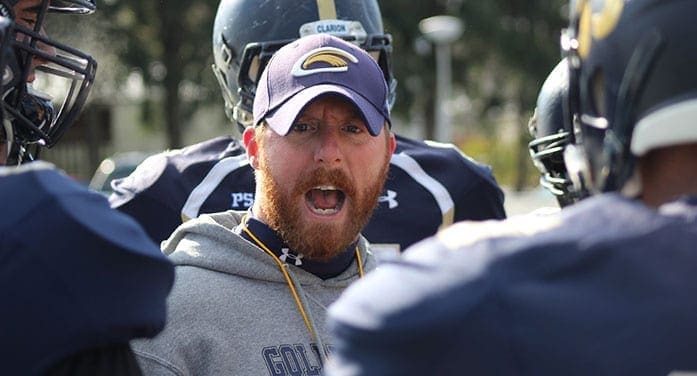“Fun is good.” – Mike Veeck, creator of a variety of innovative and fun baseball promotions
 Unfortunately, the vast majority of coaches, from the youth level to the professional level, adopt a militaristic coaching style. They believe a taskmaster mentality is how you get the best from athletes.
Unfortunately, the vast majority of coaches, from the youth level to the professional level, adopt a militaristic coaching style. They believe a taskmaster mentality is how you get the best from athletes.
It’s not.
“Nothing, according to the research, predicts excellence like finding the task fun,” says sociologist Alfie Kohn.
Coaches who make practices fun create a culture of creativity and camaraderie that attracts athletes and keeps them physically, mentally, emotionally and spiritually involved and working toward excellence — individually and as a team.
Yet, the sports culture, historically grounded in the military culture, tends to develop Vince Lombardi-type coaches who too often treat their athletes inhumanely and motivate them by force and fear.
“He (Lombardi) treats us all the same – like dogs,” said Henry Jordan, an All-Pro defensive tackle for Lombardi’s Green Bay Packers.
But can you develop athletes in a holistic manner, treat them with dignity and respect, have fun and still win?
As Kohn says, the research shows the answer is an emphatic “Yes.”
Unlike autocratic coaches like Lombardi, humanistic coaches believe people become internally motivated when treated humanely and with dignity. Humanistic coaches focus on encouragement and positive motivation tactics. They believe humans seek out fun, are curious and naturally want to actualize themselves.
Studies show that workgroups, like sports teams, characterized by a more democratic and humanistic atmosphere will have higher levels of internal motivation, satisfaction and morale. As a result, they have more commitment to the organization/team and greater productivity than those directed by authoritarian coaches/leaders.
Maybe the best example of the humanistic coaching style was John Gagliardi. Gagliardi, who died in 2018, was the football coach at Division III Saint John’s University in Minnesota. He was the winningest coach in college football history, retiring with a lifetime record of 489-138-11 after the 2012 season. In 2003, he won his fourth national championship, to go along with 26 conference titles. And he was the anti-Lombardi.
Gagliardi had no film sessions after Monday, no playbooks, no blocking sleds, no tackling leading up to games and no wind sprints. Nobody got cut. There was no yelling at players. Gagliardi didn’t use a whistle. Practices were limited to 90 minutes.
Gagliardi said his practices wouldn’t have any resemblance to a boot camp. He had no rules except the Golden Rule. Gagliardi’s quarterbacks called the vast majority of the team’s plays. If he did send in a play, he called it a “suggestion,” and the quarterback was free to disregard it.
Fun was one of the goals of every practice. His players loved coming to practice. His graduation record was nearly perfect.
Because of the limited physical contact in practice, Gagliardi’s teams had fewer injuries and less soreness. As a result, Gagliardi believed his players played with more intensity on Saturdays.
Gagliardi was a big believer in having fun with his team. He felt having a sense of humour is a key trait for a coach.
“I don’t think I could have lasted without a sense of humour,” said Gagliardi. “Let’s put it this way: there would have been no hope for me to have lasted without humour. Football is made for humour. You have to have a grin now and then on the gridiron. This isn’t life and death.”
Gagliardi believed the Golden Rule was the only rule he needed.
“I think the key is the Golden Rule,” said Gagliardi. “Treat kids the way you’d like to be treated. Coach them how you would like to be coached. We want guys to observe the Golden Rule. That will take care of almost everything. That’s our only rule. Find kids that don’t need any other rules besides the Golden Rule. Those who need other rules won’t keep them.”
On the team’s senior speech night, after one of Gagliardi’s last seasons coaching at Saint John’s, linebacker Brandon Novak described the experience of four years playing for Gagliardi this way: “Live it up underclassmen, because it goes by fast. It goes by fast, but it’ll be the best four years of your life. And once you’ve played your last game, you’ll look back and say, ‘This is the greatest place on Earth to play football.’”
Sounds like fun.
Ken Reed is sports policy director for League of Fans (leagueoffans.org), a sports reform project. He is the author of The Sports Reformers, Ego vs. Soul in Sports, and How We Can Save Sports. For interview requests, click here.
The views, opinions and positions expressed by columnists and contributors are the authors’ alone. They do not inherently or expressly reflect the views, opinions and/or positions of our publication.
© Troy Media
Troy Media is an editorial content provider to media outlets and its own hosted community news outlets across Canada.

